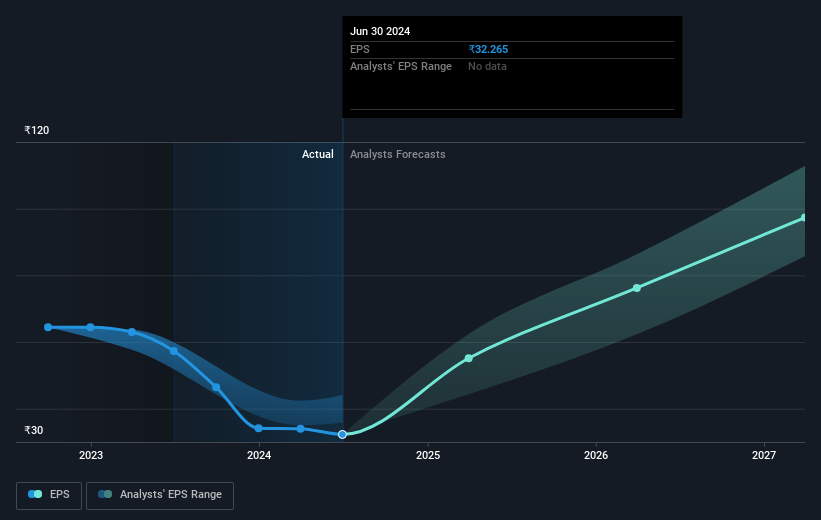- India
- /
- Telecom Services and Carriers
- /
- NSEI:TATACOMM
Tata Communications (NSE:TATACOMM) jumps 8.1% this week, though earnings growth is still tracking behind five-year shareholder returns
We think all investors should try to buy and hold high quality multi-year winners. While not every stock performs well, when investors win, they can win big. Just think about the savvy investors who held Tata Communications Limited (NSE:TATACOMM) shares for the last five years, while they gained 481%. If that doesn't get you thinking about long term investing, we don't know what will. On top of that, the share price is up 15% in about a quarter. But this could be related to the strong market, which is up 7.2% in the last three months.
After a strong gain in the past week, it's worth seeing if longer term returns have been driven by improving fundamentals.
View our latest analysis for Tata Communications
To quote Buffett, 'Ships will sail around the world but the Flat Earth Society will flourish. There will continue to be wide discrepancies between price and value in the marketplace...' One way to examine how market sentiment has changed over time is to look at the interaction between a company's share price and its earnings per share (EPS).
During five years of share price growth, Tata Communications achieved compound earnings per share (EPS) growth of 77% per year. The EPS growth is more impressive than the yearly share price gain of 42% over the same period. So one could conclude that the broader market has become more cautious towards the stock. Of course, with a P/E ratio of 65.91, the market remains optimistic.
The graphic below depicts how EPS has changed over time (unveil the exact values by clicking on the image).

Dive deeper into Tata Communications' key metrics by checking this interactive graph of Tata Communications's earnings, revenue and cash flow.
What About Dividends?
When looking at investment returns, it is important to consider the difference between total shareholder return (TSR) and share price return. Whereas the share price return only reflects the change in the share price, the TSR includes the value of dividends (assuming they were reinvested) and the benefit of any discounted capital raising or spin-off. So for companies that pay a generous dividend, the TSR is often a lot higher than the share price return. In the case of Tata Communications, it has a TSR of 517% for the last 5 years. That exceeds its share price return that we previously mentioned. This is largely a result of its dividend payments!
A Different Perspective
Tata Communications shareholders are up 11% for the year (even including dividends). But that return falls short of the market. It's probably a good sign that the company has an even better long term track record, having provided shareholders with an annual TSR of 44% over five years. Maybe the share price is just taking a breather while the business executes on its growth strategy. While it is well worth considering the different impacts that market conditions can have on the share price, there are other factors that are even more important. Take risks, for example - Tata Communications has 3 warning signs we think you should be aware of.
Of course, you might find a fantastic investment by looking elsewhere. So take a peek at this free list of companies we expect will grow earnings.
Please note, the market returns quoted in this article reflect the market weighted average returns of stocks that currently trade on Indian exchanges.
Valuation is complex, but we're here to simplify it.
Discover if Tata Communications might be undervalued or overvalued with our detailed analysis, featuring fair value estimates, potential risks, dividends, insider trades, and its financial condition.
Access Free AnalysisHave feedback on this article? Concerned about the content? Get in touch with us directly. Alternatively, email editorial-team (at) simplywallst.com.
This article by Simply Wall St is general in nature. We provide commentary based on historical data and analyst forecasts only using an unbiased methodology and our articles are not intended to be financial advice. It does not constitute a recommendation to buy or sell any stock, and does not take account of your objectives, or your financial situation. We aim to bring you long-term focused analysis driven by fundamental data. Note that our analysis may not factor in the latest price-sensitive company announcements or qualitative material. Simply Wall St has no position in any stocks mentioned.
About NSEI:TATACOMM
Established dividend payer with reasonable growth potential.
Similar Companies
Market Insights
Community Narratives



